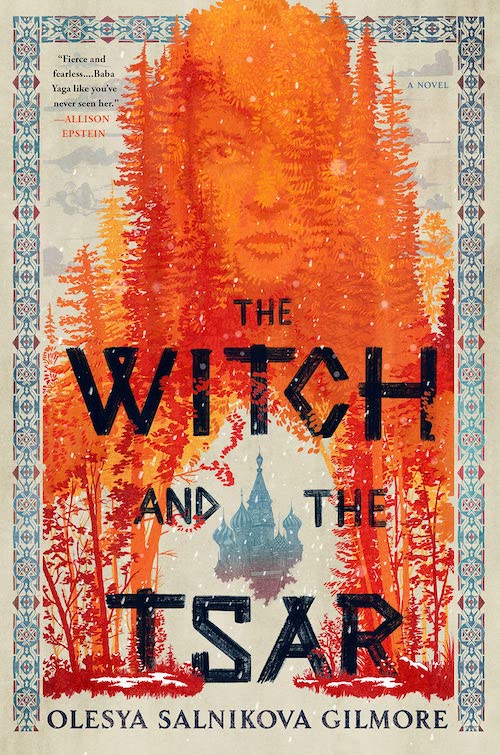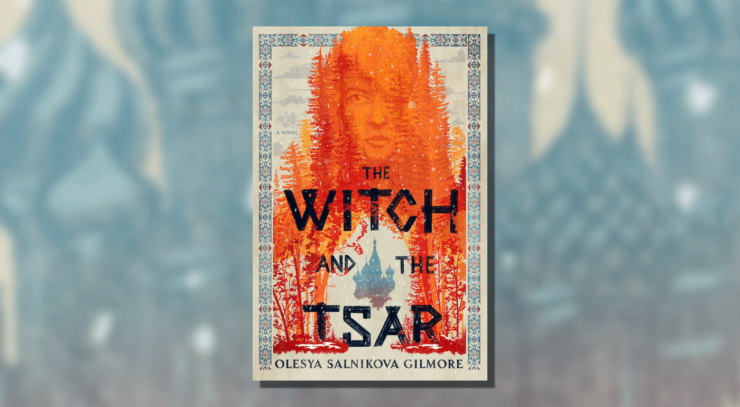As a half-goddess possessing magic, Yaga is used to living on her own, her prior entanglements with mortals having led to heartbreak.
We’re thrilled to share an excerpt from The Witch and the Tsar by Olesya Salnikova Gilmore, out now from Ace.
As a half-goddess possessing magic, Yaga is used to living on her own, her prior entanglements with mortals having led to heartbreak. She mostly keeps to her hut in the woods, where those in need of healing seek her out, even as they spread rumors about her supposed cruelty and wicked spells. But when her old friend Anastasia—now the wife of the tsar, and suffering from a mysterious illness—arrives in her forest desperate for her protection, Yaga realizes the fate of all of Russia is tied to Anastasia’s. Yaga must step out of the shadows to protect the land she loves.
As she travels to Moscow, Yaga witnesses a sixteenth century Russia on the brink of chaos. Tsar Ivan—soon to become Ivan the Terrible—grows more volatile and tyrannical by the day, and Yaga believes the tsaritsa is being poisoned by an unknown enemy. But what Yaga cannot know is that Ivan is being manipulated by powers far older and more fearsome than anyone can imagine.
We approached a palace by an awning‑covered stairway, its walls like the skin of a pomegranate, intricately carved out of marble. The journey from the ground floor to the first floor proved too quick. Before I knew it, we had walked through an anteroom and into a throne room with dark bronze chandeliers, the boyars and their wives glittering and staring and whispering, and Tsar Ivan Vasilyevich, regal and imposing on his throne.
Behind the Tsar, hundreds of candles lit a tapestry of powerful black horses and men in armor on the cusp of battle. My own battle was about to commence. In a swoop, the courtiers had backed away, and there was nothing but empty space before me.
“In this court, our women curtsy to the tsar.” The voice of Ivan Vasilyevich was deep and rumbling, reminiscent of thunder promising the blackest of tempests.
What little knowledge I had of royal etiquette fled from me. The hall was so stifling, the courtiers so numerous, so silent. Not even the presence of a wolf rattled them. They stared at us as if we were an exotic curiosity meant for their entertainment.
Buy the Book


The Witch and the Tsar
“Lower down,” whispered Kira Armikovna.
Slowly, I got to my knees. I pressed my palms against the cold floor, a shiver rippling over my skin, and bowed my head.
I saw a pair of red boots and felt a strong, warm grip as the tsar pulled me up.
Ivan was a giant, with broad shoulders and a muscular chest. But it was his features that tore the breath from my body. His penetrating dark gaze, his long nose and high forehead. I cringed as he raised his arm. But he only made the sign of the cross, his handsome face lifted to the ceiling. He seized the cross that hung from his neck and kissed it reverently. Its jewels caught the candlelight, momentarily blinding me.
The tsar held a hand to his chest. “You may call me Ivan Vasilyevich, for I owe you a debt of gratitude. My wife talks of no one else.”
A rustle went through his courtiers. Now they were rattled. Doubtless, it was by the fact that a stranger could win the tsar’s intimacy so quickly.
“Your wife is wise.” I paused, adding, “Ivan Vasilyevich.”
“She is sweet.” He tilted his head. “She often overlooks the faults of others.”
“Yes, I can see that.” The words had come out unbidden. Stupid! There was a moment of frozen silence. Then, gripping his golden belt, the tsar began to laugh, his dark red beard rippling. The laughter spread to his courtiers until the room echoed with it. “Fools!” The tsar looked about. “What are you laughing at, hmm?”
His courtiers bent low in a rustle of silk skirts and squeaking boots.
The tsar dropped to one knee. Despite my protests, he grasped Dyen’s snout and appraised him. “I have a particular affinity for beasts—we recognize each other.” He gave a surprisingly still Dyen one last caress and bounded up. “So, you are the savior of my wife, God willing.” He crossed himself and kissed his cross. Then, he took off in the direction of his throne, where he spat three times over his left shoulder and brushed his knuckles against the seat. “We do not want to put the evil eye on your fine work!” Oh, gods. The evil eye again. But the tsar was already beckoning me to come closer. I silently begged Dyen to stay before starting toward the throne.
My mouth opened in wonder as I passed the colorful murals on the curved walls, of altars and thrones, of prophets and princes. Then the central pillar with its lifelike reliefs of snakes, dolphins, and pelicans; its shelves of gold and silver plates and goblets. Next to icons, tableware was second in importance in any Russian dwelling. The tsar’s was no exception.
The throne itself was smaller than it had seemed from across the room. More spartan, too, being a relatively simple, straight‑backed chair with ivory panels. Next to the throne, a man stood. Tall, trim, with black shoulder‑length hair, a short beard, and dramatically high cheekbones that many a maiden had lost her mind and heart over. His arm rested casually on the throne, as if he meant everyone to know it was in his keeping.
The familiar burnt orange light flared in his black eyes. Recognition.
The lying, duplicitous knave! If I had not left my stick of elder outside, I would have flung it at him. For it was indeed Koshey Bessmertny, known here as Konstantin Buyanovich. I took small breaths of the hot, stale air. It smelled of terribly old things.
Ivan Vasilyevich placed a jeweled crown in his hair and sat down, one leg hitched over the arm of his throne. His clothing was the plainest of all his courtiers, in their gold, silver, and pearl‑embroidered brocades and taffetas, their silks and velvets, their feathers and ribbons. Aside from the gold belt, he wore a sepia‑colored, knee‑length rubakha with a pair of trousers. That was all.
“This is my advisor, Boyar Konstantin Buyanovich.” The tsar gestured to Koshey, who bent low, joining everyone in the room, who were all either bowing or curtsying. The tsar had not told his courtiers to stand.
“Rise, everyone, rise,” he laughed.
Then he turned back to me with those too‑keen eyes, taking the measure of me, calculating how far they could push. He proceeded to ask his questions. Where did I hail from? What city, what part of our great and powerful country? I had no doubt he already knew everything about me, though why he would let the Baba Yaga witch come to his court was unfathomable to me. Yet my nerves quieted. The tsar was putting on a show.
“You live in the forest? By yourself?” he asked, as if he hadn’t quite heard me. “With no husband to protect you?”
“Yes, Ivan Vasilyevich,” I replied carefully. Husbands and crosses were the obsession of his court. Any trace of cavalier, freethinking attitude, and I would be whisked from this place as fast as a heart was some‑ times known to fail. “Unfortunately, I never married.” I bit my cheek to keep from smiling, tasted blood.
The courtiers had started to whisper, their talk whirling through the hall like a bone‑chilling gale. Yet the tsar continued to pelt me with questions. I answered them dutifully, solemnly. What choice did I have?
Yes, I pray, daily, hourly. No, I do not go to church. I am just a woman, only a woman. I fear to go into a village I do not know with men I do not know. I kept my gaze down as a woman should, silently adding, Oh, yes, Christian tsar, I worship and pray, to the same gods you consider pagan nonsense.
“It is that vedma, that Baba Yaga said to be living in the woods!” came a muffled whisper. Then, something about chicken or goat legs, an iron nose—or was it iron teeth?—a fence with skulls of the poor boys and girls I had forced into my pech.
My heart gave a sad little flutter; my legs felt like holodets jelly.
The words of the elder in that village where I had been betrayed so hor ribly came back to me. Go. And do not return unless you want your throat slit.
“Do you own a cross, Yaga Mokoshevna?” asked the tsar.
Of course, of course. No matter that it had been at the bottom of an iron chest, rusting and rotting away. I showed it to him, my fingers trembling only a tiny bit.
“Who called this God‑fearing woman a vedma?” The tsar’s eyes roved the rows of his courtiers with an alacrity bordering on frenzy. “Show yourselves!” he barked.
“It was I, Lord Tsar.” A man bowed low. His cape, meant for princes and generals, fell from his shoulders in richly embroidered layers.
The tsar looked at him coldly and gestured to someone. From the shadows, several guards stepped out. “Take this man away,” said the tsar. “He has offended my guest, and therefore, he has offended me.”
“No, my lord! Tsar!” The man struggled vainly against the guards, who escorted him out of the room that much faster.
“From the woods to a royal court,” the tsar murmured as if nothing had happened. “Extraordinary.” His quick eyes bored into me. “My wife has known you for years. Yet this is the first I’ve heard of you. Why are you here, Yaga Mokoshevna?”
“To—” Though the tsar talked openly of my saving his wife, it was best to tread lightly, since healing was under the purview of the church. “To keep Her Majesty company during her illness,” I finished with some effort.
At first, the tsar was silent. “As you can all see,” he spoke finally, “this is a woman of God. If anyone else dares to call her a vedma, you shall answer to me.”
Excerpted from The Witch and the Tsar by Olesya Salnikova Gilmore, Copyright © 2022 by Olesya Salnikova Gilmore. Excerpted by permission of Ace. All rights reserved. No part of this excerpt may be reproduced or reprinted without permission in writing from the publisher.










